Iran Defends Naval Activities Amid Allegation Of Shipping Attacks
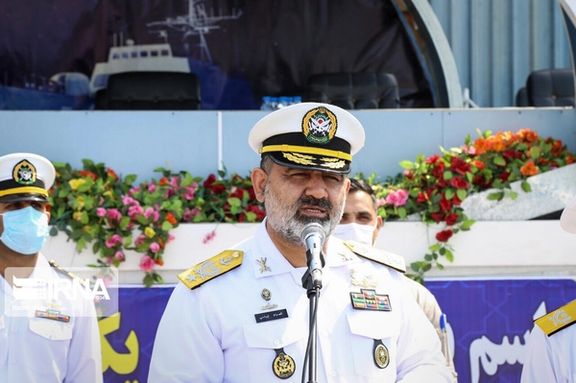
The commander of Iran’s navy has claimed it is maintaining “maritime security” in the region amid allegations of the Islamic Republic’s involvement in Houthi attacks on shipping.

The commander of Iran’s navy has claimed it is maintaining “maritime security” in the region amid allegations of the Islamic Republic’s involvement in Houthi attacks on shipping.
Admiral Shahram Irani was speaking on Friday as he announced plans for a regional naval coalition and upcoming large-scale naval exercises involving other countries along southern coasts, with additional exercises slated for the Caspian Sea region.
He said his Navy has a strategic plan to be present in the oceans, adding that “maritime security in the region is firmly established under the Islamic Republic system.”
It comes after a number of recent incidents in which shipping in the Red Sea has been targeted by Houthis.
Since the deadly clash between Hamas and Israel on October 7, the Yemen-based rebels have launched multiple drone and missile attacks on US and Israeli targets in the region. Despite accusations against Iran, the Biden administration, having removed the Houthis from the US terrorist list, has not responded to the maritime attacks.
The Houthi attacks followed Iranian leader Ali Khamenei's call to stop oil and food shipments to Israel. Controlling most of Yemen's Red Sea coast, the group had previously targeted Israel with ballistic missiles and armed drones.
While Iran has avoided direct involvement in the Israel-Hamas conflict, it allegedly employs proxy groups like the Houthis and Hezbollah to target Israel and US interests in the region. In response to Iran's actions in the critical maritime route of the Strait of Hormuz, the Pentagon deployed a portion of the Bataan Amphibious Readiness Group accompanied by a Marine expeditionary unit.
Over the past two years, Iran has been implicated in attacks, seizures, or attempted seizures of nearly 20 internationally flagged merchant vessels in the vital global shipping passage of the Strait of Hormuz, according to reports from US Central Command, responsible for overseeing operations in the Middle East region.
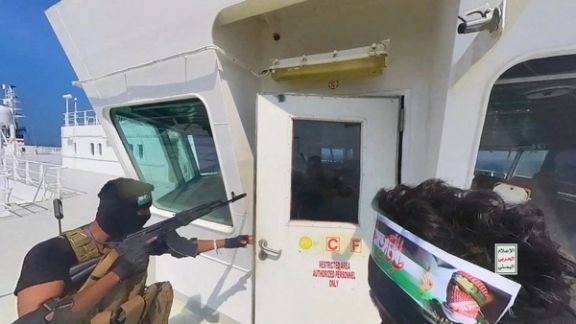
British officials have warned shipping in the Red Sea to “exercise caution” after a vessel was ordered to change course by "an entity" claiming to be the Yemeni authorities.
The incident comes after a series of attacks in Middle Eastern waters since the eruption of hostilities between Israel and Iran-backed Palestinian militant group Hamas on October 7.
On Friday, the UK Maritime Trade Operations (UKMTO) agency said it had “received reports of an entity declaring itself to be the Yemeni authorities, ordering a vessel to alter course in the Southern Red Sea.”
Agency officials added: “Vessels in the vicinity are advised to exercise caution and report any suspicious activity to UKMTO.”
On Sunday, the US military reported three commercial vessels coming under attack in the Southern Red Sea.
Yemen's Iran-backed Houthi group claimed responsibility for drone and missile attacks on two Israeli vessels in the area on Sunday. According to the Houthi group, the attacks were carried out in response to the demands of Yemenis and calls from Muslim countries to stand in solidarity with the Palestinian people.
On Wednesday, the UKMTO was informed of an incident related to a suspected drone over the Red Sea, situated to the west of the Yemeni port of Hodeidah.
Last month, the Houthi group – which controls most of Yemen's Red Sea coast -- also seized a British-owned and Japanese-operated cargo ship.
Their attempt to hijack another vessel was thwarted thanks to the US Navy as it responded to a distress call from an Israeli-managed commercial tanker in the Gulf of Aden after it had been seized by gunmen.
The Houthi attack came after calls by Iran’s leader Ali Khamenei to stop the shipment of oil and food to Israel. The group, which controls most of Yemen's Red Sea coast, had previously fired ballistic missiles and armed drones at Israel and vowed to target more Israeli vessels.
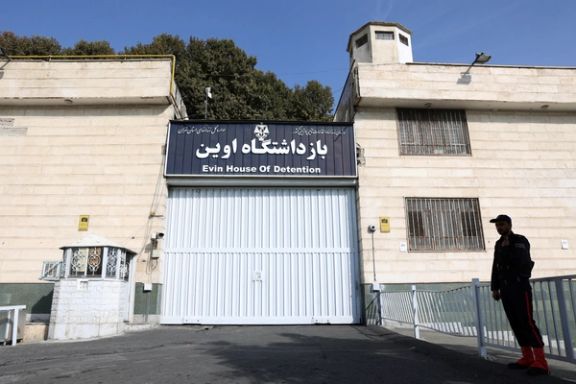
The Campaign to Free Political Prisoners in Iran (CFPPI) says use of pharmacological torture against political prisoners has increased alarmingly in the past year.
The Canada-based non-profit has urged the international community to investigate this type of torture and deaths resulting from it in Iran. “The Islamic regime in Iran must be held accountable for its crimes against political prisoners,” a recent report by CFPPI, said.
Pharmacological torture is the use of psychoactive, psychotropic drugs or other types of drugs to punish, extract information, or to subdue prisoners into compliance by causing distress in the form of pain, anxiety, panic, psychological disturbances, immobilization, hallucination, paranoia, disorientation, and addiction without leaving obvious physical signs of violence.
CFPPI has said in its report that it conducted extensive investigations that indicated an alarming increase in the use of pharmacological torture in Iran in the past five year and particularly since Women, Life, Freedom protests that began in late September 2022. Their findings draw on testimonies of those arrested during the protests of 2022-2023 as well as on the accounts of former political prisoners.
According to CFPPI's report, the regime has intentionally and systematically subjected more political prisoners to pharmacological torture by sending detainees to mental hospitals and forcibly administering anti-psychotic drugs at multiple prisons across the country, as well as by mixing drugs into their food and drinks.

“Whereas formerly, prison guards would offer sedatives to prisoners, which many of the younger and newer prisoners voluntarily accepted to ease their experience, new reports suggest that since September 2022 the practice has changed to violent and coercive administering of unwanted drugs,” the report said.
One of the victims interviewed for the report, a 27-year-old woman who said she had been raped several times during her detention, told CFPPI that she was forced into taking unidentified pills which had a profound impact on her, leading to psychotic episodes. After her release from prison, she attempted to take her own life and lost one of her kidneys.
Prisoners say they have also noted serious pains and aches in the absence of the drugs.
Dissident rapper Saman Seydi (Yasin) is among political prisoners who have spoken up about their tortures including administration of unidentified pills and injections at a very high cost. He has been sentenced to death and is still in prison.
Yasin was held at a mental hospital on the orders of the notorious judge Abolghasem Salavati for four days as punishment for smuggling out an audio file from Tehran’s Evin Prison in which he described tortures including being subjected to mock execution.
At the mental hospital where he was tied to the bed, security forces beat him for refusing to allow them to inject him with an unknown substance. Yasin claims he fell unconscious for 24 hours after the injection and has been having problems with his eyesight and balance since then.
Yasin’s torturers, he says, wanted to force him to “confess” to possession and use of a firearm during last year’s protests.
In several other cases in the past year, detainees including young protesters have died soon after their release from prison under suspicious circumstances.
Pressure on victims’ families to accept “suicide”, “sudden death”, or “overdose” as cause of death of individuals with no prior record of major health problems, depression or addiction has raised suspicions that the deaths may have resulted from pharmacological torture.
“Pharmacological torture is extremely distressing and punitive as it causes severe physical pain, harmful and painful physiological changes, confusion, perceptual abnormalities, fearfulness and anxiety, lethargy, and loss of personal agency,” William Hopkins, Consultant Psychiatrist at Freedom from Torture who has worked to rehabilitate survivors of pharmacological torture from various countries is quoted by the report as saying.
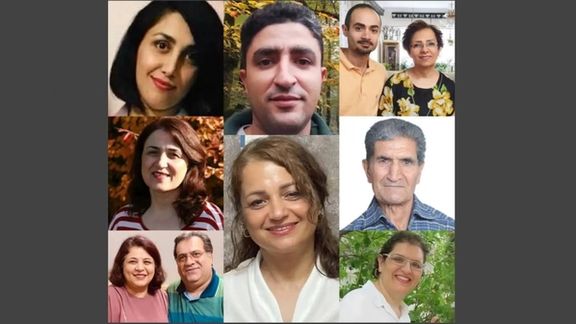
Followers of the Baha’i faith continue to be systematically persecuted by the Iranian authorities, in cases uncovered by Iran International.
One adherent of the religion, Nahaleh Shahidi, is still in jail after being apprehended in April by security forces at the Kerman railway station and subsequently transferred to Kerman prison.
He is reportedly facing charges of "propaganda against the system" and "formation of groups with the intention of disrupting national security."
He was informed of the accusations months ago, but no formal indictment has been issued. A source close to Shahidi’s family says the prosecutor's representative has allegedly halted the progression of the case on a number of pretexts.
The source said that Shahidi's detention is routinely extended each month, without any indication of a trial or release with bail in sight.
On Thursday, legal proceedings were initiated against five Baha'i residents from Ghaemshahr in northern Iran. The defendants learned about the prosecution through text messages on their phones.
A source close to the families of the residents expressed concern, saying, "It seems that security forces are attempting to fabricate cases against the individuals, as there is still no news about the charges and reasons for filing a case against them."
Informal sources estimate that over 300,000 Baha'i citizens reside in Iran. However, the Constitution of the Islamic Republic officially recognizes only Islam, Christianity, Judaism, and Zoroastrianism. Baha'is constitute the largest non-Muslim religious minority in Iran and have been systematically targeted for persecution since the 1979 revolution, facing arbitrary detentions, discrimination, and restrictions on religious practices.

An Iranian businessman living in Canada is facing deportation for alleged complicity in crimes against humanity after supplying surveillance cameras to the Tehran regime.
Roohollah Firooznam ran a business for 12 years which provided the equipment to Iran's intelligence services, including the IRGC.
The cameras were used to monitor detainees in prisons where torture was used, and to watch political opponents, the Global News reported.
Senior members of the intelligence ministry were directors of Firooznam’s company, while a former vice-president of Iran was a shareholder. Firooznam's business partner in a separate venture was a high-ranking Islamic Revolutionary Guard Corps commander who had previously spent a decade guarding Iran's Supreme Leader Ali Khamenei.
Despite allegations of involvement with Iran's regime, Firooznam managed to obtain a travel visa from the Canadian embassy in Turkey in 2018, ostensibly for visiting tourist attractions. Upon arriving in Toronto, he engaged the services of an immigration lawyer and applied for refugee status.
Earlier this year, an Ontario judge sanctioned his deportation, citing his complicity in Iran's crimes against humanity.
Firooznam, a former member of the IRGC naval branch turned CEO, claimed ignorance of the regime's abuses until 2017. He claimed that he took action against the regime upon discovering that his cameras were used against anti-government opposition.
However, the Canadian Refugee Board rejected his refugee claim in 2021, asserting his complicity in Iran's crimes against humanity. In response, Firooznam filed a new case in the Federal Court of Appeal in November 2023, seeking expedited processing of his immigration application.
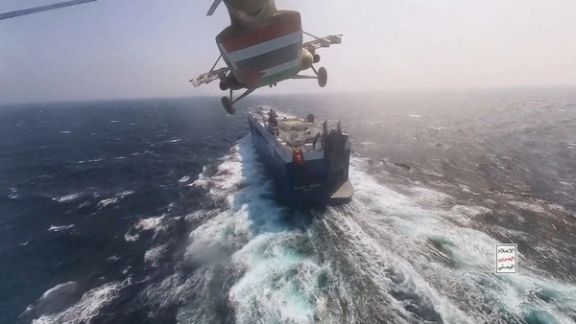
The US government has once again blamed Iran for Houthi drone and missile attacks on ships in the Red Sea, according to a senior White House official.
Reuters reported Thursday that deputy national security adviser Jon Finer has said that the Biden administration thinks the IRGC is behind the attacks, helping with planning and action.
"We believe that they are involved in the conduct of these attacks, the planning of them, the execution of them, the authorization of them and ultimately they support them," he told the Aspen Security Forum.
This is the first time the IRGC is directly linked to Houthi operations by a US official.
US National Security spokesman John Kirby took Iran to task on Wednesday for destabilizing the region by providing financial and military assistance to extremist militant groups, such as Yemeni Houthis.
“We know that the Houthis are supported by Iran, not just politically and philosophically but, of course, with weapon systems,” he stressed.
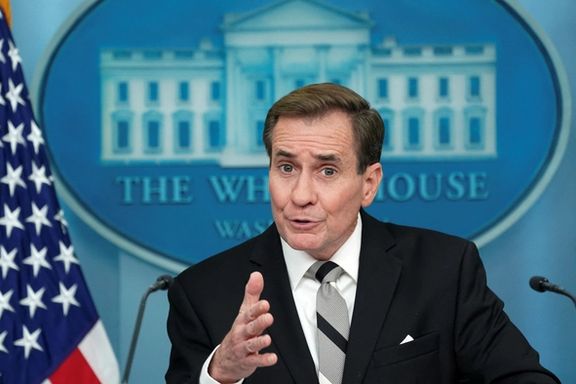
The Biden administration has been trying to avoid conflict with Iran ever since Hamas forces attacked Israel, fearing that the war on Gaza could expand and set the whole region ablaze.
A Politico report Wednesday suggested that senior Biden administration officials were against targeting Houthis for now, despite the marked increase in Houthi activities in the Red sea, which has forced two US warships to engage militarily.
On Wednesday, the USS Mason intercepted and shot down a drone launched from a Houthi-controlled area. Three days earlier, USS Carney shot down three drones after it received distress calls from vessels that had come under attack from Iran-backed Houthis in the Red Sea.
The Houthis say their attacks are in response to the Israeli onslaught on Gaza, which began after Hamas rampaged Israel on 7 October, killing a thousand people.
On Thursday, the US treasury sanctioned 13 people and entities over claims they provided “tens of millions of dollars” in Iran-linked funds to Houthi rebels in Yemen.
“The Houthis continue to receive funding and support from Iran,” the under secretary of the Treasury for terrorism Brian Nelson said. “Treasury will continue to disrupt the financial facilitation and procurement networks that enable these destabilizing activities.”
Iran of course denies involvement in the missile and drone attacks by the Houthis on Israel and vessels in the Red Sea. The official line from the regime spokespersons is that militant groups linked with Tehran act independently.
Earlier in the week, a senior adviser to Ali Khamenei said the same about Hamas – that the group had the means necessary to plan and execute operations, notwithstanding the fact, he suggested, that Iran would help the group militarily if it had access to Gaza Strip.
Asked about the future of the conflict and the hopes for a two state solution between Israel and the Palestinians, Kamal Kharrazi told Aljazeera, “this is their own business, of course. We have our own positions but we’re not going to dictate our positions to others.”
The former foreign minister of the Islamic Republic reiterated, however, that the regime didn’t “believe in” a two state solution. “Israel itself is not supporting this plan… and it’s not practical,” Kharrazi said, “We believe the final solution must be one state, composed of Muslims, Christians and Jews.”
The Islamic Republic has for long maintained this ambiguous, sit-on-the-fence politics, sending mixed messages on their intentions and their actions. In recent years, this has been largely helped by the Biden administration’s leniency, which many in Washington say has emboldened the regime and its proxies in the region.
“It [is] President Biden who refuses to respond to the recent attacks on American troops by Iran in Syria, in Iraq, in the Red Sea,” Senator John Kennedy told Fox News Thursday.
“The sad reality is that our enemies - China, Russia, North Korea, Iran - are not scared of President Biden. And for good reason," he said. “The Biden administration would rather debate whether man can breastfeed than protect the interests of this country.”